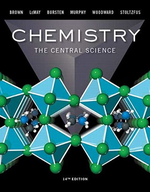?(a) Which of the following cannot leave or enter a closed system: heat, work, or matter? (b) Which cannot leave or enter an isolated system?
Chapter 5, Problem 5.21(choose chapter or problem)
(a) Which of the following cannot leave or enter a closed system: heat, work, or matter?
(b) Which cannot leave or enter an isolated system?
(c) What do we call the part of the universe that is not part of the system?
Unfortunately, we don't have that question answered yet. But you can get it answered in just 5 hours by Logging in or Becoming a subscriber.
Becoming a subscriber
Or look for another answer
